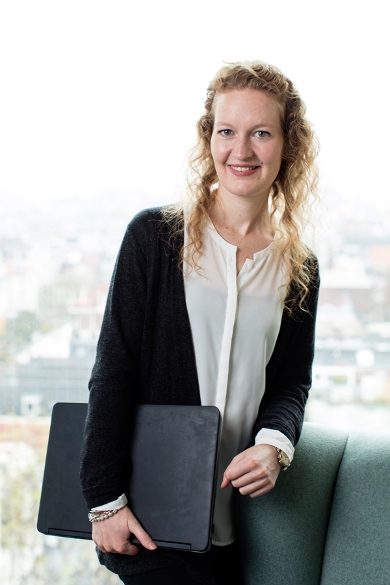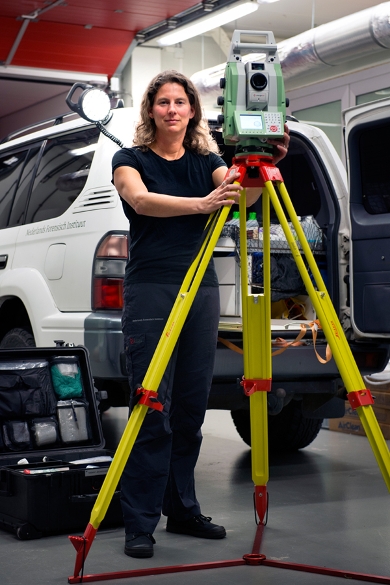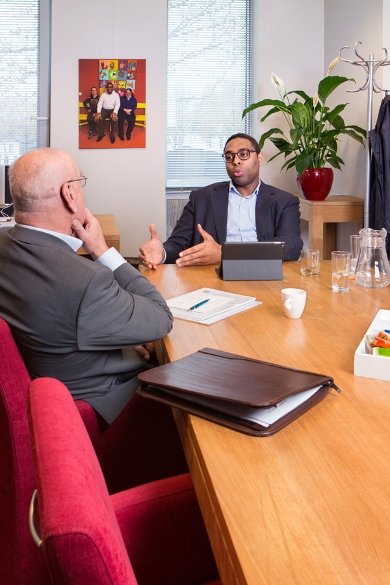
On the job market with a Leiden degree
Every year around 3,900 master's students sign their name in Leiden's famous 'Sweat Room' when they graduate. What do they do after that? Five young alumni talk about their work.
Maths: analysing patterns

Frejanne Ruoff (1991) is mad about working out structures and patterns. 'Maths is a kind of language with its own grammar rules. Solving a mathematical equation is like writing a poem.’ While she was studying, Frejanne tutored other students and was also a student ambassador. ‘With hindsight, what I was doing outside my studies was an important complement to my studies.'
Frejanne is a marketing intelligence analyst for a company that specialises in data analysis. 'I can spend the whole day puzzling things out, programming and analysing. I need to be able to think from the client's point of view. I also train clients and colleagues in different aspectso f the work, from programming to presenting.' Read the full interview.
Astronomy: problem-solving skills
After graduating in Astronomy, Christopher Bonnet (1983) studied for a PhD in Barcelona. ‘Even from when I was very young I was fascinated by space; I wanted to be an astronaut.' In Barcelona, Christopher conducted research on the expansion of the Universe. 'For most of the early part of my studies I didn't really know what it was like to do research. That didn't come until later.'
Christopher is particularly grateful for the problem-solving skills he developed during the programme. 'Even if you don't go any further in astronomy - and that's quite likely because it's a field where the jobs are scarce - it's a very useful skill. In many organisations, the top jobs are taken by people with a technical degree (astronomy, maths, physics) because they are able to break complex issues down into manageable chunks.' Read the full interview.

Archaeology: thinking practically
Roosje de Leeuwe (1972) chose to study Archaeology at a later age because she wasn't happy with her job in shipbuilding. 'For me, it was fascinating that you could make a reconstruction of something. That's why I decided to study archaeology.' Thinking practically and spatial awareness can be really important in archaeology,' Roosje explains. 'You only get one chance to excavate a site, so you have to plan the logistics very carefully.'
After graduating, Roosje started work as a field archaeologist with the Zelfstandig Archeologisch Onderzoeksbureau (Independent Archaeological Research Agency) at Leiden University. 'At Nistelrode we found a bronze treasure trove with 31 dishes. After cleaning one of the dishes, I could see an image of Hercules. Wow, I thought. I'm the first person to see this in 1700 years!' Read the full interview.
Psychology: a journey of discovery
Psychology is a journey of discovery, says Jeanin Bou Rached (1987), in which you look for the why of a situation. After graduating in Psychology, she started to work as an institutional psychologist at a penitentiary institution. She works with detainees to prepare them for their return to society. 'I didn't cure them; I taught them to handle their situation and prepared them for their release.'
By showing respect and warmth, Jeanin hopes she can show the detainees that what they did was wrong. Her aim is clear: 'Make sure that detainees are understood and that they are not dangerous, for themselves or for prison staff.' Read the full interview.

Public Administration: democracy, the law and freedom
Dave Ensberg (1985) knew when he was only fourteen that he wanted to study Public Administration. 'That's because of my parents and my background. My grandfather was Vice-President of Suriname and I used to listen to his stories from when I was very young. I was fascinated by the idea of what it must have been like to govern such a young republic.' Dave's family lived in Suriname but had to flee after the military coup. 'That made us even more aware of the importance of democracy, law and freedom.'
After his bachelor's, Dave did an internship with the journal PM. 'I wrote several articles for PM and won a prize for my bachelor's thesis, and then I was approached by PricewaterHouseCoopers about working for them. Working for PWC is something like being a footballer in the Champions League of consulties in public administration. That's when my career got going.' Read the full interview.
In our alumni magazine Leidraad we regularly feature young alumni. Leidraad is published three times a year and is sent free to all former students of the University. Read more about Leidraad.
